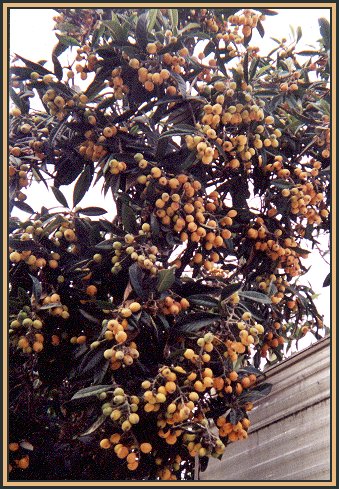|
THE FRUIT
Loquat fruit are one of the first fruits to ripen each year and normally come available in California during May and June. A lot of Our requests come from people who ate loquat fruit when they were growing up. It is a taste they do not forget and want to experience that taste again and again. It has a taste of its own that is hard to describe. Some people describe it as tasty and sweet with minimal tartness. Some say the loquat fruit have a tangy flavor. Others may say it is sweet but lacks acidity. Even others describe the loquat fruit as having a sweet & sour berry taste The taste differs between different loquat varieties. The taste also differs if one picks them when they are just getting ripe or have been ripe for some time. What We provide is a mixture of varieties that are in season at that time. In this way, We provide a sampling of various tasty loquat fruit to compare with. Keep in mind that some smaller varieties of loquat fruit are more tastier than larger fruit or vice versa. The loquat fruit in each box may be a little different from loquat fruit in other boxes. There is no uniformity. PACKAGING The loquats are usually packed in a 11" X 8.5" X 5.5" Flat Rate Priority Mail box. Although We weight the boxes while being packed, We do not count the fruit. If the fruit are smaller, We can get more fruit in the box. The boxes are lined inside with various types of cushioning material. We maintain a minimum of 3 pounds of fruit with stems in each 3-pound box. Each box contains a mixture of different varieties of loquats, sizes, and flavors from different trees. Some may be big, some may be medium size, and others may be small. Bigger is not always better. Some fruit may be sweeter and others may be more tart or may have a little different taste. The contents of each box will be somewhat different from another box in some ways. There is no uniformity except for the box size and a minimum of 3 pounds of fruit with stems in a 3 pound box. We have packages sent all over America where Flat Rate Priority Mail is delivered. We normally send out the packages on the first, second, or third work day of each week when available so that they arrive on or before Saturday. When requesting two or more 3-pound boxes early in the season, We can have one box sent the first week, the second box or two the next week, et cetera, according to your written request. Keep in mind that there are only four to six weeks in a loquat fruit season. If you want the boxes all delivered at the same time, especially if you are planning on canning or processing the loquat fruit, or serving them all at the same time at some function, please indicate it on your request. If there are no instructions on your request, it is then left to Our discretion and or to Our preference. How long does loquat fruit last? This loquat fruit has been stored away in a home refrigerator for eight months along with other loquat fruit. Each individual loquat fruit was carefully wrapped in tissue paper and placed in a small plastic container with lid closed. 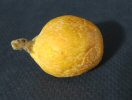
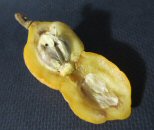
Most of the loquat fruit were in pretty good shape after eight months of storage except for haveing lost some moisture and are a little bit wrinkled. But, still taste good! 



|
>
Jack Slevkoff's Enterprises
provides...
LOQUAT FRUIT Also called May Apple, Japanese medlar, and Japanese plum In Japan, the fruit are called “biwa.” In Mandarin Chinese, the name is “pipa.” People in some European countries such as Spain, Italy, and Sweden, call the loquat fruit “nispero,” “nipero,” “nespoli,” or “mespel.” In Portugal, the fruit is called “nêspera,” “magnório,” “magnesia,” or “manganium.” In Brasil, it’s called Ameixa-amarela (which translates to Yellow plum). In some African countries, they are called “daidai,” “ukukhangela,” or “kupoteza.” In the Middle East they are called “acadinias.” In the Slavik areas, they are called “mišpule.” In Hungary, “japán naspolya.” 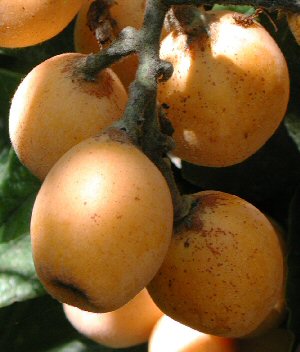
For each yearly loquat season, we begin accepting requests with payment on or after April 15 even though fruit may not be sent out until after first week in May. Our fresh ripe Loquat fruit are usaully available for picking from the beginining of May all the way to the beginning of June; depending on weather and temperature. As of May 16, the loquat fruit were not ready to be picked yet. Our first picking will be May 22 and 23. Our last picking will be May 30. For some reason, such as weather, temperature, pollination, and other conditions, the loquat fruit are ripening more than three weeks later than previous years. Each 3-lb box will have more than 3 lbs of loquat fruit with stems. Checks and money orders will be cashed immediately to verify bank clearance. Early orders will be filled when there are enough ripe fruit to pick. Requests will be filled on a first-come basis. Orders received after May 31 may be returned if there is not enough good fruit to pick. S&H costs shown are for destinations within USA The fruit is sent via Priority Mail.
If you would like to buy at a lower cost on behalf of a large family, an enterprise, a neighborhood, a commumity, an event, or want to distribute to stores in your area, I would suggest buying at wholesale prices and make arrangements with us and with a trucking outfit to arrange for pickup and delivery. Keep in mind that the fruit has to be refrigeated during delivery to maintain freshness. For large quantity, click on button below: 

For those who come in the back door such as through a search engine, our web-site (URL) address is "http://www.LoquatWorld.com" 
Thank you! for visiting our webpage and possibly buying Loquat Fruit from us. |
Recent years are very much like the past and will vary from year to year. In 2018, We started picking on May 1 but there was only enough fruit ripe enough, initially, to fill only three boxes. More fruit ripened after receiving some hot weather. The loquat fruit season was about a week or two later than previous years. Also, some fruit were smaller compared to other years. Some had no seed pits. The last day We were accepting requests was May 23 and the last picking day was May 30. In 2017, We started picking and filling some requests on April 24, stopped accepting requests on May 18, and the last picking day was May 30. In 2016, We started picking and filling some requests on April 27 and the last picking day May 31. In 2015, We started filling some requests on May 4 and the last picking day was May 18. Because of the sudden extreme heat and smaller crop, the season was shorter. In 2014, We started filling some special requests on April 21 and 29 and officially started the picking season on Monday, May 5. The official last picking day was May 20. However, some remaining requests were filled Tuesday, May 27, and Wednesday, May 28. Temperatures of 95 to over 100 degrees from May 13 to May 16 accelerated the ripening of the fruit. In 2013, We officially began picking on Monday, May 13. Last picking day was May 22. Any requests or orders for fruit after May 21 were returned or refunded. We had a lot more requests for fruit but the crop was much smaller. In 2012, We began picking on Monday, May 21. Last picking day was June 11. In 2011, We began picking on Monday, May 16. Our last picking day was Monday, June 6. As of June 12, We did not receive any hot weather that was 90ºor hotter. Our last orders went out at end of June. In 2010, We began picking on Monday, May 24. Some fruit were ripe to pick and some were still green or just starting to turn color from green to yellow. California did not have any hot days until the end of May. We normally start picking about a week after We receive some hot weather. Every year is different. This year has been much cooler than other years. We normally pick on a Monday so that you would have the package(s) before the weekend. Once We start picking, the season will last for about three to four weeks. In 2009, We began picking on May 4 for about three weeks. In 2008, picking began on May 9 and ended June 2. We had a heat wave from May 16 to May 20 with record breaking temperatures of 103 degrees and greater on May 17. In 2007, picking began on May 8 and ended on May 29. In 2006, We were out of fruit for sale on May 21 In 2004, We were out of fruit for sale on May 19 REFRIGERATE Refrigerate the loquat fruit upon arrival. The loquat fruit will last at least a couple of weeks if properly refrigerated between 35 and 50 degrees as long as the fruit is not damaged and the stems are still intact. Individually wrapping each fruit with a part of a paper towel or tissue paper will also increase the life of the fruit along with refrigeration. We received: "Dearest Jack!!! As soon as my Mom came home & saw the box, she began dancing around like a little girl!! I got her to pose very briefly before diving in and at the moment, she is currently tearing into them!! She remembers them from growing up in the Azores/Portugal & has been pining for them all year!!! Thank you SO much for the excellent work and especially for making her SO happy!! She says that they are perfect!! Much love & sign us up for the next 50 years!! ;)" Tammy Rose & Fatima Rose 
|
|||||||||||||||||||||||||||||||||||||||||||||||||||||||||||||||||||||||||||||||||||||||||||||||||||||

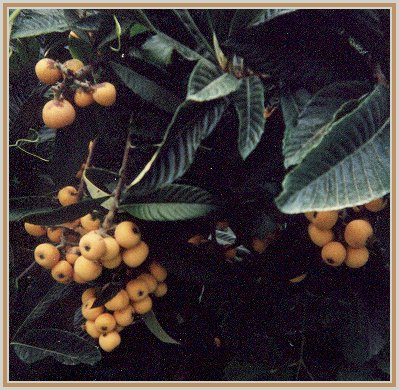 Loquats [pronounced: "LOH-kwahts"] are one of the first fruits to ripen in the spring.
The tartly sweet, aromatic 1-1/2" golden-yellow to orange
fruit resembles an apricot in size and color. Most loquats ripen in mid
to late spring. The juicy, crisp flesh is pale yellow and has a delicate,
sweetly tart cherry-like or pear-like flavor. The flesh surrounds 1 to 3 seeds that are about
the size of apricot pits or smaller. The seeds are smooth and rounded but somewhat flatted
on one or two sides. The yellow fleshy edible fruits are eaten raw, cooked, or
made into jelly. These fruits are favorites among Asian cultures.
Loquats are closely related to the pear and apple trees...not the citrus tree called "komquat".
Loquats [pronounced: "LOH-kwahts"] are one of the first fruits to ripen in the spring.
The tartly sweet, aromatic 1-1/2" golden-yellow to orange
fruit resembles an apricot in size and color. Most loquats ripen in mid
to late spring. The juicy, crisp flesh is pale yellow and has a delicate,
sweetly tart cherry-like or pear-like flavor. The flesh surrounds 1 to 3 seeds that are about
the size of apricot pits or smaller. The seeds are smooth and rounded but somewhat flatted
on one or two sides. The yellow fleshy edible fruits are eaten raw, cooked, or
made into jelly. These fruits are favorites among Asian cultures.
Loquats are closely related to the pear and apple trees...not the citrus tree called "komquat".
